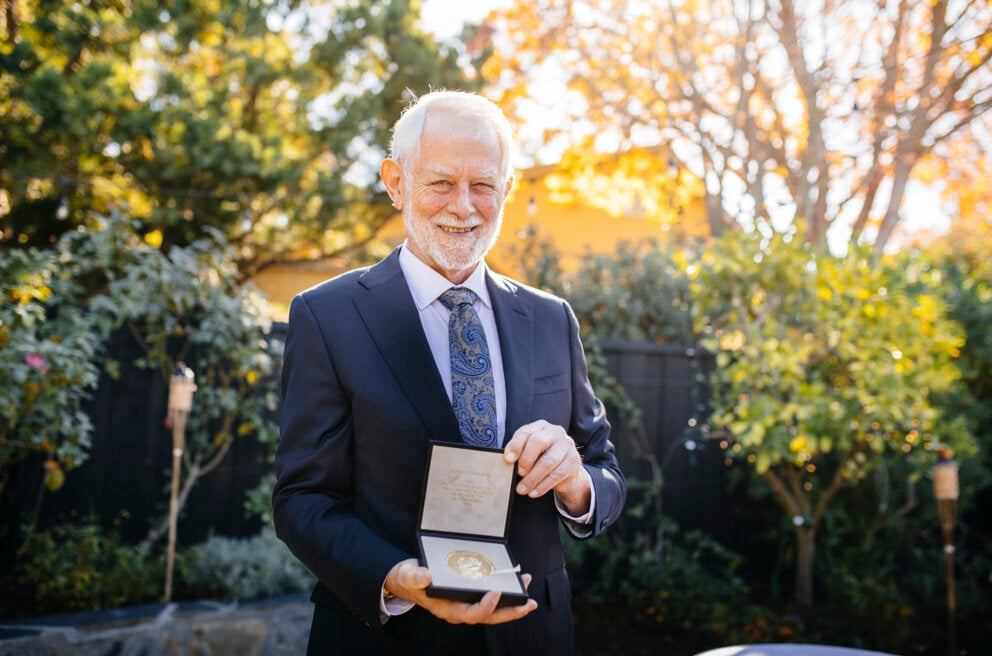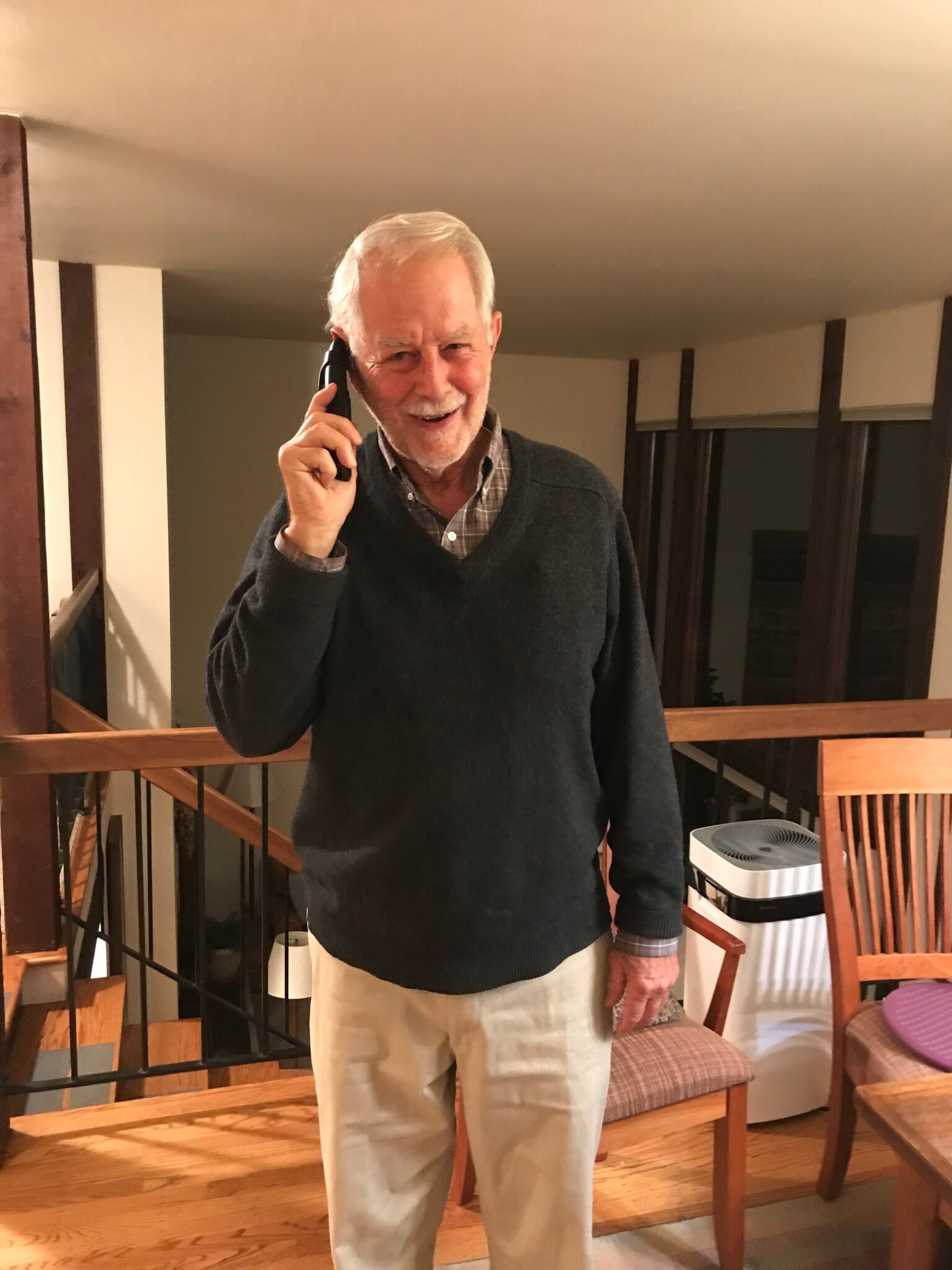Robert B. Wilson
Interview
Interview, February 2021

Robert B. Wilson with his Prize medal and diploma.
© Nobel Prize Outreach. Photo: Elena Zhukova
“I encourage young people to just have a little bit of curiosity”
Nobelprize.org spoke to economist Robert Wilson on 3 February 2021 about teaching future laureates, collaborating with fellow laureate Paul Milgrom and dealing with failure.
Telephone interview, October 2020
“The two of us live, what, only 40 metres apart”
Telephone interview with Robert B. Wilson following the announcement of the 2020 Nobel Prize in Economic Sciences on 12 October 2020. The interviewer is Adam Smith, Chief Scientific Officer of Nobel Media.
Not only are the 2020 Economics Science Laureates long-time collaborators, they are also neighbours in Palo Alto, and so when Robert Wilson heard the news of his prize from Stockholm, he simply crossed the street and knocked on Paul Milgrom’s door to wake him! “It sounds like something from the nineteenth century,” says Wilson in this interview, recorded shortly after the news became public. He describes his pride at the fact that Milgrom is the third of his students, after Alvin Roth and Bengt Holmström, to be awarded the prize, a perfect combination of events that he calls his “trifecta”.
Interview transcript
Robert Wilson: Hello, I’m here.
Adam Smith: Good morning, my name is Adam Smith, I’m calling from Nobelprize.org. Many congratulations on the award.
RW: Thank you.
AS: We just spoke with Paul Milgrom and he said that he heard the news by you walking across the street and ringing his doorbell.
RW: Well that’s right because he had turned his phone off for the … to get a good night’s sleep, and so somebody had to wake him, and he lives across the street so I just walked over and knocked on the door. I roused him.
AS: I think … I think this must be a first in the history of the Nobel Prize.
RW: Yes, how many times does … first to have a knock on the door, which sounds like something from the 19th century, and secondly that in fact the two of us live only, what, 40 m apart.
AS: Precisely, and you breaking the news. So what did you actually say to each other, what was his reaction?
RW: Well, I said congratulations. He later told me that his reaction was that he thought that maybe he … only he had won and why wasn’t I included, which was very sweet of him. I have always thought of him as the leader in all of this so … but I take great pride in him because he was my PhD student so I take a lot of pride in having sort of at an early stage influenced him, and in this whole field of market design and auction design. This of course, by the way, is the third of my students who’ve won Nobel Prizes.
AS: That’s right because you also had Al Roth and Bengt Holmström, didn’t you?
RW: That’s right. So this is what I have been telling people, that if Paul won I would have a trifecta, that is you know the perfect combination of events. That’s turned out well.
AS: In cricketing terms we’d call it a hattrick.
RW: Ah, a hattrick, ah, very good.
AS: I asked … I asked Paul Milgrom this question also, but what is the magic between you that makes you so productive?
RW: Well, I’ve been more of a speculative thinker, and he is very precise. I mean the spectrum auction design relied a lot on very innovative elements that, that he put in. I was more of a traditional auction theorist. But he was so innovative in designing an auction that, what we call a package auction, that is a situation in which buyers can bid for packages of licences – there might be complements, there might be substitutes, it’s all very complicated – and in a sense he thought outside the box and created a really innovative design, with good attention to the … having the right kind of incentives for bidders to be truthful in their bid, you know, somewhat truthful, or of course you want an outcome that’s efficient. The people who value the licences the most should be the ones who would be winning them. So it’s a complicated design, and went on over time … that first auction, I think, started in December and ended in March. You know it involved billions of dollars … So I’m just getting a message here from Bengt. He just called on the other phone. That’s happy news from Bengt.
AS: Goodness. It’s, yes …
RW: I’ve always been very proud of Bengt and Al, and Paul. They’re wonderfully talented fellows.
AS: In these socially-distanced times it’s a bit difficult, but obviously what needs to happen is that you all come together again to celebrate this new event.
RW: That’s right, it would be nice.
AS: My warmest congratulations again.
RW: Let me say it’s so appropriate that your name’s Adam Smith.
AS: The name Adam Smith can of course get me into trouble because there have been Economics Laureates in the past who have rather disbelieved that Adam Smith would call on the day of the announcement. It’s been a huge pleasure speaking to you. I hope we can speak at greater length, but for the moment, wishing you a wonderful day.
RW: Thank you very much.
AS: Thank you. Congratulations again.
RW: Bye.
AS: Bye.

Photo of Robert B. Wilson taken by his wife, Mary Wilson, during the telephone interview with Nobelprize.org, after the announcement of the 2020 Prize in Economic Sceonces, 12 October 2020.
Photo credit: Mary Wilson
Did you find any typos in this text? We would appreciate your assistance in identifying any errors and to let us know. Thank you for taking the time to report the errors by sending us an e-mail.
